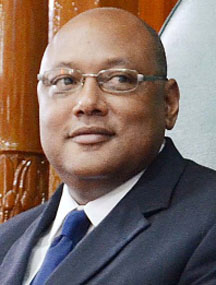Obtaining the services of full-time legal counsel to serve Parliament Office will be a priority once the National Assembly comes out of recess in October, Speaker Raphael Trotman says.
Currently, such services are provided by Cecil Dhurjon, who is Chief Parliamentary Counsel within the Ministry of Legal Affairs but Trotman said yesterday that there needs to be a de-linking of Parliament Office from government if the institution is to function independently.
Trotman told Stabroek News that the road to having Parliament Office retain its own legal counsel began some time ago and he noted that he led a delegation on a trip to London during which they engaged the Chief Parliamentary Counsel of the British Parliament. Following that meeting, the Speaker said, he was sent information which was to assist in setting up a similar service in the local Parliament Office.
In addition to these developments, he said that earlier this year Clerk of the National Assembly Sherlock Isaacs and his office created a proposal for an Office of Legal Counsel, to serve the Parlia-ment Office. According to the proposal, aside from the legal counsel, his or her office would also be staffed with a researcher and a word processing operator, and possess all the amenities that would be needed to carry out the works required of the office.

Having been agreed on by the Parliamentary Manage-ment Committee, Trotman said that the proposal was sent to a select committee to be examined and was agreed on by members of all the political parties represented in the National Assembly. The proposal was sent back to, and was supposed to be finalised by the Management Committee, but Trotman said the budget debates, and then the debates leading up to the recess caused the proposal to be placed on the back burner temporarily.
Also pertinent for the setting up of the office, Isaacs told Stabroek News, is the permission of the Ministry of Public Service. Before the positions are created, and the advertisements to fill those positions posted, the ministry must first send written approval. Although requests seeking approval have been sent to the ministry since July 18, Isaacs said, the ministry has not even replied to acknowledge receiving the correspondence. Since sta-ffing of public sector jobs is up to the ministry, neither Isaacs nor the Speaker can take further action on this matter.
The issue of ensuring that Parliament Office is in possession of its own legal counsel was not seen as a very pressing matter prior to the 2011 general elections, since the pre-2011 administrations–both the People’s Progressive Party/Civic (PPP/C) and the People’s National Congress (PNC) before it–all held a majority in the National Assembly. As a result, the only bills that ever reached the President’s desk for assent were those that government had allowed and therefore voted to pass. If opposition bills or motions were brought but did not find favour with the majority government, it used its majority to vote against it.
Also, during these times, whatever bills were passed by the National Assembly were sent to the Chambers of the Attorney General (AG) for his staff to provide legal counsel on the proper preparation of the bills. This practice was not an issue since the government administration only passed bills it was in agreement with, and therefore had no qualms with a government agency providing such scrutiny.
However, signs that separate, non-government counsel might be needed became apparent shortly after the PPP government lost its majority standing in the National Assembly to the combined A Partnership for National Unity (APNU) and Alliance for Change (AFC) opposition. The fact that the opposition party now has the majority has created a situation where bills with which the minority government disagrees can still be sent to the president for assent. Already, two opposition bills, neither of which found favour with the government, were sent to the AG’s Chambers, where they spent a very long period of time before being sent to the President, who eventually refused to assent to them.
More recently, four local government bills, although passed with government’s support, have been sitting in the AG’s chambers for close to a month. These realities have attracted much criticism, primarily from the opposition parties, which argue that there is no legal justification for sending the bills to the AG’s Chambers. They instead argue that the National Assembly’s Standing Orders require the Clerk to keep the bills, having been passed, before sending them to the President. But Isaacs said the complex nature of the amendments that had to be inserted made it clear that legal counsel would be required to complete the task. Since Parliament lacks the capacity to carry out this function, he said, his hands were tied.








